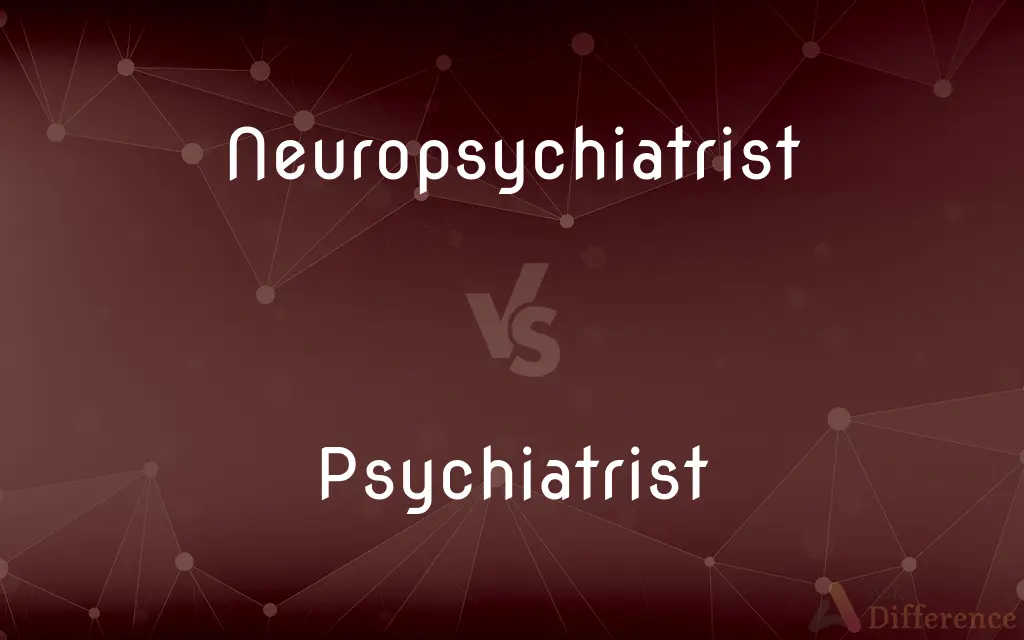Neuropsychiatrist vs. Psychiatrist — What's the Difference?
By Maham Liaqat & Urooj Arif — Updated on March 26, 2024
A neuropsychiatrist specializes in understanding how brain disorders affect behavior and cognition, while a psychiatrist focuses on diagnosing and treating mental health disorders.

Difference Between Neuropsychiatrist and Psychiatrist
Table of Contents
ADVERTISEMENT
Key Differences
Neuropsychiatrists are medical doctors who focus on the interface between neurology and psychiatry, particularly how neurological disorders can lead to psychiatric symptoms. They often deal with complex conditions like traumatic brain injury or dementia. On the other hand, psychiatrists are also medical doctors but their scope is broader, focusing on the diagnosis, treatment, and prevention of mental health disorders, including mood disorders, anxiety disorders, and schizophrenia.
Neuropsychiatrists require a deep understanding of the brain's structure and function, as their work often involves patients whose psychiatric symptoms are directly linked to neurological conditions. Psychiatrists, while also knowledgeable about the brain, primarily use psychological approaches and medications to treat mental health conditions, which may not necessarily have a clear neurological basis.
Training paths for both specialties involve medical school, but neuropsychiatrists typically undergo additional training in neurology and psychiatry to understand the complex interactions between brain function and behavior. Psychiatrists complete a residency in psychiatry, focusing on psychological treatments and pharmacotherapy for mental health issues.
In practice, neuropsychiatrists might conduct detailed assessments of cognitive functions and use specific neurological tests to diagnose their patients. Psychiatrists, however, might rely more on psychiatric evaluations, patient interviews, and behavioral observations to formulate a diagnosis.
Despite their differences, both neuropsychiatrists and psychiatrists often work collaboratively in multidisciplinary teams to provide comprehensive care for patients with conditions that have both neurological and psychiatric components, such as epilepsy or Parkinson’s disease.
ADVERTISEMENT
Comparison Chart
Focus
Brain disorders affecting behavior and cognition
Mental health disorders
Training
Medical school, plus additional training in neurology and psychiatry
Medical school, followed by residency in psychiatry
Approach
Neurological tests, cognitive function assessments
Psychological evaluations, medication, therapy
Typical Conditions Treated
Traumatic brain injury, dementia, neurological conditions with psychiatric symptoms
Mood disorders, anxiety disorders, schizophrenia
Diagnostic Methods
Detailed neurological and cognitive assessments
Psychiatric evaluations, patient interviews, behavioral observations
Compare with Definitions
Neuropsychiatrist
Utilizes neurological assessments to diagnose.
The neuropsychiatrist performed tests to evaluate memory and attention deficits.
Psychiatrist
A medical doctor specializing in mental health.
The psychiatrist prescribed medication for anxiety and depression.
Neuropsychiatrist
A doctor specializing in how brain disorders affect mental processes.
The neuropsychiatrist assessed the cognitive impact of the patient’s brain injury.
Psychiatrist
Focuses on psychological rather than neurological assessments.
The psychiatrist used interviews and questionnaires for diagnosis.
Neuropsychiatrist
Treats conditions with both neurological and psychiatric symptoms.
She consulted a neuropsychiatrist for her father's Parkinson's-related depression.
Psychiatrist
May treat patients without clear neurological conditions.
She visited a psychiatrist to talk about her stress and insomnia.
Neuropsychiatrist
Requires expertise in both brain function and mental health.
Neuropsychiatrists use MRI scans to understand brain changes.
Psychiatrist
Diagnoses and treats a wide range of mental illnesses.
He saw a psychiatrist for therapy sessions to manage his bipolar disorder.
Neuropsychiatrist
Focuses on the intersection of neurology and psychiatry.
Neuropsychiatrists often treat patients with neurodegenerative diseases.
Psychiatrist
Uses a combination of medication and therapy for treatment.
Psychiatrists often recommend cognitive behavioral therapy.
Neuropsychiatrist
The medical study of disorders with both neurological and psychiatric features.
Psychiatrist
A psychiatrist is a physician who specializes in psychiatry, the branch of medicine devoted to the diagnosis, prevention, study, and treatment of mental disorders. Psychiatrists are medical doctors and evaluate patients to determine whether their symptoms are the result of a physical illness, a combination of physical and mental ailments or strictly mental issues.
Neuropsychiatrist
A medical doctor specializing in neuropsychiatry; a medical doctor dealing with disorders that have both neurological and psychiatric features.
Psychiatrist
A physician who specializes in psychiatry.
Psychiatrist
(medicine) A medical doctor specializing in psychiatry.
Psychiatrist
A physician who specializes in psychiatry
Common Curiosities
What kind of therapy do psychiatrists offer?
Psychiatrists may offer various types of therapy, including cognitive behavioral therapy, psychoanalysis, and supportive therapy, depending on the patient's needs.
Can both neuropsychiatrists and psychiatrists prescribe medication?
Yes, both are medical doctors and can prescribe medication.
Who should see a neuropsychiatrist?
Individuals with psychiatric symptoms that may be linked to neurological conditions, like brain injuries or neurodegenerative diseases, should see a neuropsychiatrist.
Can psychiatrists treat brain injuries?
Psychiatrists can treat the psychiatric symptoms resulting from brain injuries, but they typically work alongside other specialists for comprehensive care.
Is additional training required to become a neuropsychiatrist?
Yes, additional training in both neurology and psychiatry is required after medical school.
What's the main difference between a neuropsychiatrist and a psychiatrist?
Neuropsychiatrists specialize in brain disorders affecting mental processes, while psychiatrists treat a broader range of mental health disorders.
What are the typical conditions a neuropsychiatrist treats?
Conditions like traumatic brain injury, epilepsy, and dementia, especially when these conditions have associated psychiatric symptoms.
Are neuropsychiatrists and neurologists the same?
No, neuropsychiatrists focus on psychiatric symptoms arising from neurological disorders, while neurologists treat neurological conditions without necessarily focusing on psychiatric symptoms.
Are there any specific tests that only a neuropsychiatrist would use?
While neuropsychiatrists use many of the same tests as neurologists, they specifically look at how neurological conditions impact cognitive functions and behavior.
What makes neuropsychiatry unique in the field of medicine?
Its unique focus on the interplay between neurological conditions and psychiatric symptoms distinguishes it in the medical field.
How often should one visit a psychiatrist?
The frequency of visits to a psychiatrist varies based on the individual's condition and treatment plan, ranging from weekly to bimonthly or less often.
How do psychiatrists diagnose their patients?
Through psychiatric evaluations, patient interviews, behavioral observations, and sometimes psychological testing.
Can a neuropsychiatrist work in mental health settings?
Yes, neuropsychiatrists can work in mental health settings, especially in cases where mental health conditions overlap with neurological issues.
Do neuropsychiatrists perform surgery?
No, they do not perform surgery; they focus on diagnosis and medical management.
What is the role of psychiatrists in managing chronic mental illnesses?
Psychiatrists play a crucial role in managing chronic mental illnesses through ongoing medication management, therapy, and support for patients and their families.
Share Your Discovery

Previous Comparison
Automobile vs. Bus
Next Comparison
Diligence vs. PerseveranceAuthor Spotlight
Written by
Maham LiaqatCo-written by
Urooj ArifUrooj is a skilled content writer at Ask Difference, known for her exceptional ability to simplify complex topics into engaging and informative content. With a passion for research and a flair for clear, concise writing, she consistently delivers articles that resonate with our diverse audience.
















































